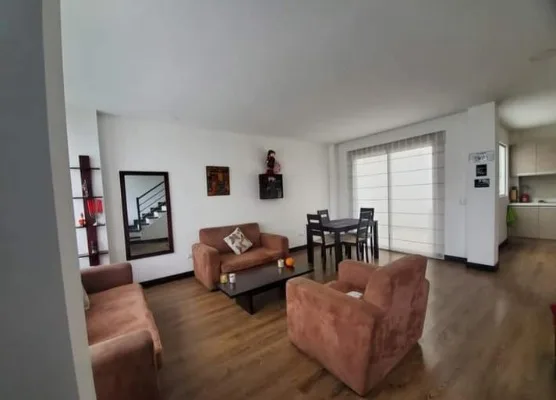Matthew Bagels brings New York Jewish traditions to Cuenca and plans a new location in Quito

Karina Lalama (left) is learning how to bake and operate a Jewish bakery. She is hoping to open a Matthew Bagels and Bakery in Quito.
By Stephen Vargha
Less than a decade ago, most Cuencanos did not know what a bagel, the doughnut-shaped yeast-leavened roll that is characterized by a crisp and shiny crust with a very a dense interior, was.
“Cuencanos asked me if they were doughnuts. They wanted to add ice cream sprinkles to them,” said Jennifer Rodriguez, co-owner of Matthew Bagels and Bakery. “Now they know and ask for them in the varieties we sell.”

Matthew enjoys some bagel chips with schmear (cream cheese).
Rodriguez and her husband, Juan Pallo, opened their bagel shop in a kiosk at the Supermaxi de las Américas shopping center in October 2016. “At the beginning, we were just breads,” said Pallo. “Three months later, we started making bagels, becoming the first place in the city to make them.”
“The customers were driving me crazy with requests for bagels,” Rodriguez added.
Bagels have a long Jewish history that experts cannot totally agree upon. It is believed that bagels originated in Poland. Beyond that, there is no clear cut answer as to why bagels came about.
In the 13th century in Poland, Jews were prohibited from baking bread because of the commonly held belief that they were viewed as enemies of the Catholic Church. It was decreed that Jews should be denied any bread at all because of the holy Christian connection between bread, Jesus, and the sacrament.

Glen Knight (left) has been a customer since Matthew Bagels opened. He always gets different bagels.
The Polish Prince Boleslaw the Pious in 1264 said, “Jews may freely buy and sell and touch bread like Christians.” That did not sit well with a group of Polish bishops, who forbade Christians to buy any baked goods from Jews, suggesting that they contained poison for the unsuspecting gentile. So, Jews created the bagel, which was boiled and not baked, to satisfy everyone.
The first printed mention of bagels is in 1610 in the Community Regulations of Kraków, Poland. It stated that bagels would be given as a gift to any woman in childbirth. Bagel means ring or bracelet in Yiddish, a fusion language spoken by eastern European Jews that was a combination of Germanic, Hebraic, and Slavic languages. Its round shape was believed to bring good luck during childbirth and a long life for the baby.
Between 1880 and 1930, Latin America experienced its largest influx of Jewish immigration. Many ended up in Argentina, Brazil, Chile, and Mexico, bringing bagels with them. Pallo’s mother’s family ended up in Chile. She fled the country when President Salvador Allende was in power.

Besides bagels, all sorts of Jewish baked goods are sold including scones and cookies.
Pallo grew up Jewish in Quito, which had the largest population of Jews in Ecuador. Rodriguez did the same, but in Guayaquil, which had the second largest population of Jews.
“I went to synagogue as a kid,” said Pallo. “I do try to get together with American Jews in Cuenca to celebrate the holidays. We are hoping to open a synagogue here soon.”
Pallo added that he sometimes does Shabbat, the Jewish Sabbath. “I pray every day,” said Pallo.
His Jewish heritage and the demise of the Sucre in 2000 sent Pallo to New York City. “I moved to Forest Hills. It had a large Jewish population. I picked it to be with the Jews,” said Pallo. “It made me comfortable. And it was the happiest years of my life.”

Jennifer Rodriguez prepares some bagel sandwiches.
He worked in several Jewish Kosher bakeries. Pallo said there were about 1,500 Jewish bakeries in New York City at that time. “My first job was making everything. That included Jewish rye bread, all the Jewish breads and desserts, including rugelach (a filled baked confection) and hamantaschen (triangular filled-pocket pastry),” said Pallo. “Then I did just bagels for three years.”
During his 13 years in the Big Apple, Pallo met Rodriguez. Their son, Matthew, was born in 2009. Four years later, the family moved to Quito, where they opened a Spanish restaurant.
That lasted only two years as friends in Cuenca enticed them to move south. “We had never been to Cuenca,” said Pallo. “After visiting Cuenca, we decided it was a great place to have a Jewish bakery.”

Juan Pallo pours out more dough for his sourdough breads.
Five years ago, they moved to their Los Alamos location that backs up to Av. de las Américas and is very near a Tranvía station. “This is like an old fashion New York bakery and deli,” said Pallo. “In New York, it is a family business. We try to make Matthew Bagels feel that way for our customers.”
Everything is New York about their bagels. “New York City means bagels. That’s it! Not even Italian food,” said Pallo. “How many times have you heard someone ask to bring back bagels from New York?”
An American expat was overheard one time telling his wife that the bagels were just like New York’s. “They better be,” Rodriguez said to the couple. “We learned to make them there!”
That means using kosher yeast from Israel. They get their yeast from a large Jewish food store in Guayaquil. After forming the bagels, they are put into very hot water. That is followed by having the bagels proofed, where the dough is allowed to rest and rise a final time before baking.

Juan Ballo puts another batch of his popular breads into the oven.
The special proofer and bagel oven come from the United States. “We ordered them from New York and had them from the beginning,” said Pallo. “It makes a lot of difference. At the very beginning, we used a local oven and it did not work.”
Pallo said their most popular bagel is the Everything Bagel. They also have sesame, onion, salt, poppy, cinnamon-raisin, and sometimes garlic. “Poppy seeds are difficult to get in Cuenca. We have to import them,” said Pallo. “Others try to copy us with chia seeds, but that’s not the same.”
The choices are why expat Glen Knight is a regular. “I have been getting their bagels since they started with a kiosk,” said Knight. “It’s the best bagels in Ecuador. I like them, all so I get a different one each time I come.”
Named after their son, Matthew Bagels and Bakery is more than bagels. “My specialty is pastries,” said Rodriguez. “I bake cupcakes, cookies… mainly American desserts.”

Bagels are put into boiling water before the final rise and baking.
Pallo is there seven days a week to make sure there is something for everyone. That includes their sourdough breads. “Our American customers ask for Jewish rye, pumpernickel, and bialy (round and baked with a depressed middle filled with cooked onions),” said Pallo. “Caraway seeds have too strong a taste for Ecuadorians, so we only put them into our rye bread for special requests.”
Matthew Bagels is now talking about expanding. “I am learning the business so I can open a Matthew Bagels in Quito,” said Karina Lalama. The native of Quito met Pallo when they were engineering students at Zamorano University, in Honduras. “I have two weeks of training before deciding where in Quito we will open it. Right now, we are looking at the economic zone and Cumbayá.”

A bagel is taken out of the hot water before it is baked.
“Cumbayá is known as ‘Cumba York’ for its large population of Jews,” said Rodriguez.
The competition in Quito will be The Mister Bagel shop, which was founded by an American in 1995. In Cuenca, Matthew Bagels and Bakery is in a class all by itself with its New York quality bagels and lots of schmear (cream cheese) available seven days a week.
___________________
Matthew Bagels and Bakery, Los Alamos 340 y Del Arrayán, Cuenca, +593 099-860-4290, https://www.facebook.com/MatthewBagelStore/, Monday-Saturday: 9 a.m. to 7:30 p.m., Sunday: 10 a.m. to 6 p.m.
Photos by Stephen Vargha
Stephen Vargha’s new book about Cuenca, “Una Nueva Vida – A New Life” is available at Amazon in digital and paperback formats. His blog, “Becoming Cuenca,” supplements his book with the latest information.


















